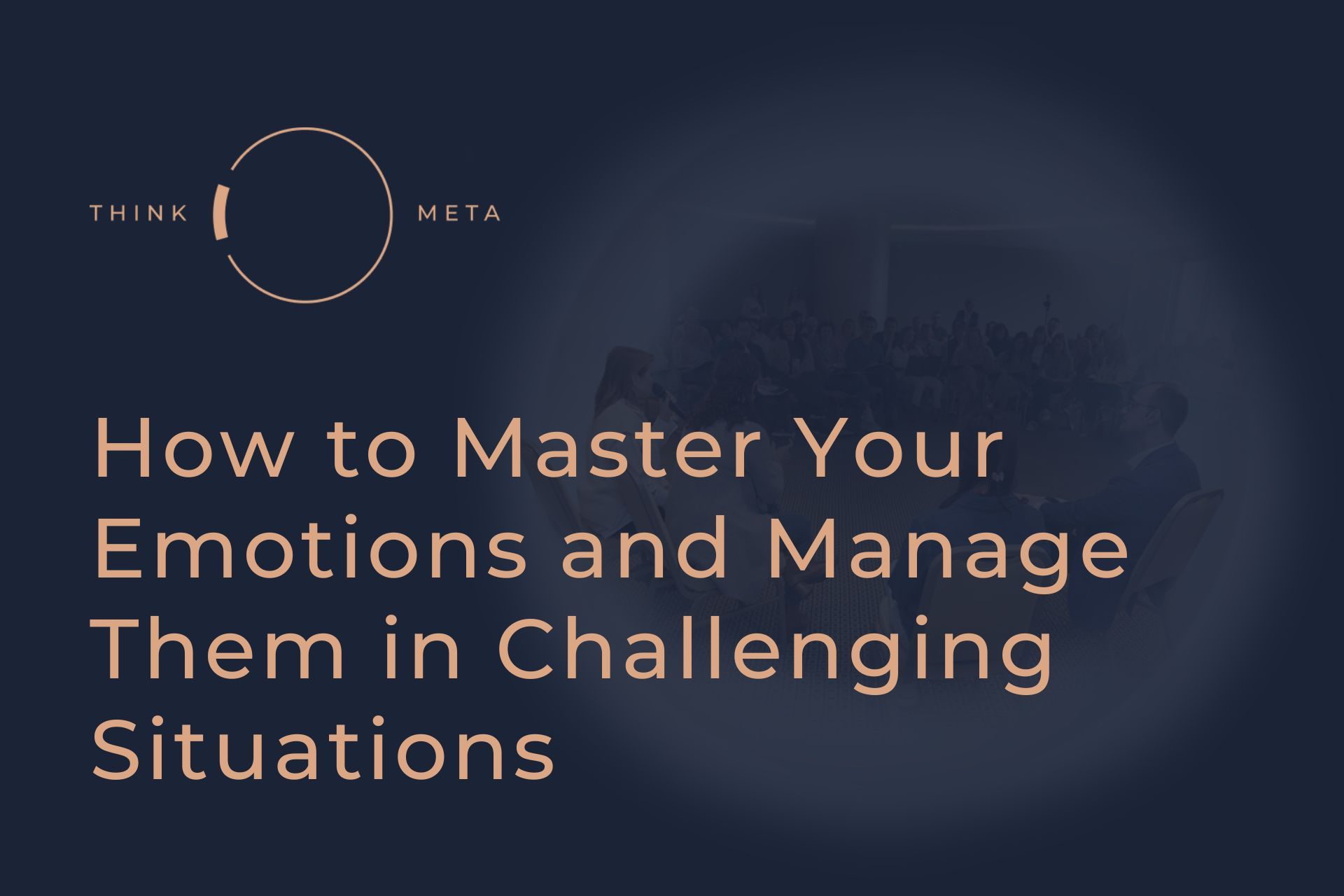How to Master Your Emotions and Manage Them in Challenging Situations

Although it might seem that emotions, in particular emotional regulation and intelligence, have become more popular topics lately, it's true that emotions have intrigued scientists for a long time. Even Darwin was interested in emotions, and he observed similar patterns of facial expressions in humans and animals. He found confirmation in that similarity that emotions must play a vital role in our survival. Later, scientists like Ekman (1973) confirmed that some emotions are universal such as happiness, sadness, anger, disgust, surprise, and fear.
While feeling emotions is universal, expressing them could be (and usually is) under the direct influence of culture. We learn which emotions we can display in which situations and how and when we should hide our true feelings. All of that impacts communications.
However, in the context of achievement, intellectual capacity (IQ) was considered to be the key factor for success for a long time. IQ is used as an indicator of giftedness and often also during the recruitment process (Serrat, 2017). Nowadays, we know that emotional intelligence is equally, if not more important.
The Power of Emotional Intelligence
Some authors define emotional intelligence as the "ability, capacity, skill, or self-perceived ability to identify, assess, and manage the emotions of one's self, of others, and of groups" (Serrat, 2017; pp.329). People with high emotional intelligence are more self-aware, and therefore they know themselves better, but they also more accurately recognise emotions in others.
There are five separate areas of emotional intelligence (for more details, check Serrat, 2017) :
- Self-awareness - consists of emotional awareness, self-confidence, and accurate self-assessment.
- Self-regulation - includes self-control, trustworthiness, conscientiousness, adaptability, and openness to new ideas.
- Self-motivation - is characterized by achievement, drive, commitment, optimism, and initiative.
- Social awareness - includes several traits such as empathy, inclined toward service and helping others develop political awareness, and leveraging diversity.
- Social skills - such as communication, influence, leadership, conflict management, building bonds, and inspiring and guiding groups and people.
The first three areas cover personal competencies, while the last two are related to social competence. In other words, we need to understand our own emotions, to be able to regulate them and to motivate ourselves but also to be aware of the emotions and needs of other people, to communicate clearly, and manage relationships.
Becoming Aware of Your Emotions
Some people seem more in touch with their own emotions than others. Accessing and talking about emotions comes naturally and effortlessly for them. Unfortunately, that is not the case for all people. Our personality (e.g., curiosity and open-mindedness) could affect our emotional awareness, as well as our upbringing (if we did not talk about emotions, then it is hard to fully understand them when they occur).
The good news is that we can become more aware if we practice some particular skills.
To increase self-awareness, it's necessary to allow ourselves to feel different emotions. It is not enough just to think and analyze our emotions on an intellectual level. Allowing ourselves to feel will also increase our accuracy (have you ever been in a situation when you genuinely don't know how to identify all that you were feeling? I know, I did!). Finally, understanding emotions and knowing that we already naturally overcome some not-so-pleasant emotions gives us confidence for the future.
Strategies for Handling Emotions in Difficult Situations
Emotional regulation is one of the key characteristics of emotional intelligence. The first step is, of course, to understand what we feel and why (i.e., the connection between emotions and thoughts), but it is also important to be able to regulate emotions and use them for our own good.
Emotional regulation isn't about hiding your true feelings. Rather it is about finding the best way to express them while increasing the chance of fulfilling your goals and maintaining good relationships with others.
Serrat (2017) described a person with good emotional regulation as someone who stays calm and focused under pressure, can control and manage impulsive feelings, acts ethically, takes responsibility for their own mistakes, builds trust, keeps promises, and has flexibility and adaptability.
It is not hard to imagine how useful all these characteristics and behaviors would be for each of us in our professional and personal lives, but how do we achieve them? There are many proven techniques, so you should find what works the best for you.
Here are some of the most widely used techniques:
Breathing exercises and grounding techniques
These techniques are particularly useful when we are dealing with anxiety. By focusing on our breathing, we are giving our brain time to reevaluate the situation that was initially seen as threatening.
Grounding is another simple intervention, often recommended to people dealing with anxiety and panic attacks. The moment you start feeling overwhelmed, focus on your surroundings using your senses. For example, find five red objects in the room, or focus on all smells you can detect, etc.
More about these techniques and others can be found in this link.
Cognitive reframing and challenging negative thoughts
This technique initially came from cognitive therapy but nowadays is widely used in other therapeutic and coaching programs.
Cognitive reframing" encourages clients to consider their emotional experience as a single moment in time and to view their current emotional state from a longer time perspective" (Clark, 2013, p. 7)
The main idea is that how we think about a situation or event directly affects how we feel. The goal is to identify "irrational" thoughts and replace them with more realistic ones.
For example, if you think: "My presentation must be perfect; otherwise, everyone will think I'm stupid, and I can't handle it," - you will probably spend more time fighting with negative emotions than preparing the presentation. Or you will get sick from worry and not even show up for work. Neither scenario is good for your career. However, if you reframe your thoughts into something like: "It's important that the presentation goes well because I want to show my colleagues that I am competent. However, even if it's not perfect, it won't be the end of the world" you will probably feel better and also perform better.
So, cognitive reframing is not about denying the truth. It is about not blindly believing everything our brain "says" and seeing a broader perspective.
Building Emotional Resilience
Above mentioned techniques will help you during an acute crisis; however, over time, you can also develop emotional resilience, which will help you be better prepared when facing new challenges.
Cultivating a strong support network will increase your stress resilience. Having a good support system is essential for mental health and well-being.
Also, developing healthy coping mechanisms and habits will help you be more resilient. Finally, working with a specialist (therapist or coach) will help you unlock your full potential.
Effective Emotional Regulation for Personal Success
Since we are social beings, emotional intelligence is essential for our personal and professional development. Understanding our own and others' emotions is key to effective communication and connection.
Emotional intelligence is not only important for leaders (although it is essential). One study (Miao et al., 2016) reported that emotional intelligence could affect our attitude toward work. Namely, participants with higher emotional intelligence also expressed greater job satisfaction and commitment towards the organization and less intention to leave.
Maintaining Emotional Balance and Well-Being
Being emotionally intelligent does not mean you will always feel good and have control over every situation. The reality is that each of us sometimes feels lost, confused, and misunderstood. We also make mistakes, so it's important to practice self-compassion and self-care.
Also, it's important to know your limits. Work-life balance is essential for emotional health, and imbalance might lead to emotional exhaustion. Working on your emotional intelligence could help you detect the early symptoms of emotional exhaustion sooner and create a more effective coping strategy.
Finally, many studies have shown that emotional intelligence is also associated with better health. A meta-analysis (Martins et al., 2010) showed that Emotional intelligence was associated more strongly with mental and psychosomatic well-being than physical health was (although the association was still significant). In other words, emotional intelligence seems to be one of the factors that contribute to healthy living.
Literature
Clark, D. A. (2013). Cognitive restructuring. The Wiley Handbook of cognitive behavioral therapy, pp. 1–22.
Ekman, P. (1973). Universal facial expressions in emotion. Studia Psychologica, 15(2), 140-147.
Miao, C., Humphrey, R. H., & Qian, S. (2017). A meta‐analysis of emotional intelligence and work attitudes. Journal of Occupational and Organizational Psychology, 90(2), 177–202.
Martins, A., Ramalho, N., & Morin, E. (2010). A comprehensive meta-analysis of the relationship between emotional intelligence and health. Personality and individual differences, 49(6), 554-564.
Serrat, O., & Serrat, O. (2017). Understanding and developing emotional intelligence. Knowledge solutions: Tools, methods, and approaches to drive organizational performance, 329-339.

